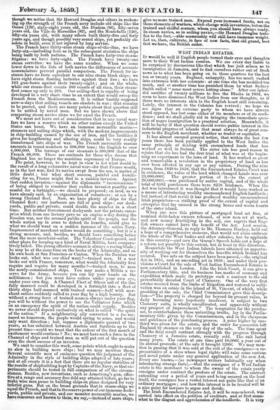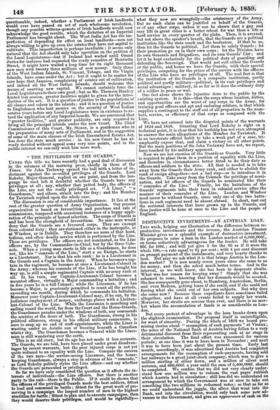WEST INDIAN ESTATES.
IT would be well if English people turned their eyes and thoughts more to their West Indian cousins. We are every day liable to be surprised by discussions like that which has just arisen as to immigration in Jamaica, and to find ourselves rather out of fresh news as to what has been going on in these quarters for the last ten or twenty years. England, unhappily, has too much rushed into extremes with her colonists : at one time she has meddled too much, and at another time has punished them by what Sydney Smith called "some most severe letting alone." After our splen- did sacrifice of twenty millions to free the Blacks in 1834, we seem to have dismissed the West Indies from our thoughts, as if there were no interests akin to the English heart still remaining. Lately, the interest in the Colonies has revived ; we hope we see signs that an extreme party to whom we have always stood opposed, has lost some either of its members or of its confi- dence; and we shall gladly aid in bringing the immediate ques- tion of negro immigration to a practical solution. Meanwhile, it will be lucky if that question should revive public interest in the industrial progress of islands that must always be of great con- cern to the English merchant, whether as trader or capitalist.
It has almost escaped general notice, that within the last few years there has been partially applie to the West Indies the same principle of dealing with encumbered lands that has worked so well in Ireland. The sister isle has good reason to rejoice that she has had the first trial of what was at the begin- ning an experiment in the laws of land. It has worked as great and remarkable a revolution in the proprietary of land as has ever been effected in any age or any nation. During the nine years, from 1849 to 1858, that the Encumbered Estates Court was in existence, the value of the land which changed hands was over 23,000,000/. The greater portion of it—to the extent of 20,000,0001.—was purchased by native capital, and of the whole total of 8582 purchasers there were 8258 Irishmen. When the Act was introduced it was thought that it would have worked as a means of introducing wealthy unencumbered English landlords ; but instead of that result it has produced wealthy unencumbered Irish proprietors—a striking proof of the extent of capital and enterprise that lay unused in the strong boxes and warm hearts of the sister island.
When one sees this picture of mortgaged land set free, of nominal debt-laden owners released, of new men set at work, and new money fructifying in the soil, one regrets that Eng- lish owners cannot have the benefit of the Act. Last session, the Attorney-General, in reply to Mr. Thomson Hankey, held out a hope of a comprehensive measure that would not alone embrace the whole of the West Indies and Other' colonies but be applied° in this country—and now the Queen's Speech holds out a hone of a reform not possibly to this extent, but at least in this direction. Meanwhile the West Indian Islands have obtained an opportu- nity of working out for themselves the benefits which Ireland has secured. Two acts on the subject have been passed,—the original Act in 1854, and an amending act in 1858; and under their pro- visions a Court for the sale of West Indian Encumbered Estates is now established in London. Like the Irish Court, it can give a Parliamentary title, and its business has marks of economy and expedition which made its prototype such a contrast to the old proverbially dreaded Court of Chancery. One of the very first estates rescued from the limbo of litigation and restored to culti- vation was an estate in the island of St. Vincent, of which, while presiding at the sale, the Chief Commissioner gave this descrip- tion—" The property is charged far beyond its present value, is daily becoming more hopelessly insolvent, is subject to two Chancery suits, is wholly uncultivated, and apparently without any prospect of improvement." The temptation for the purcha- ser, to counterbalance these uninviting truths, lay in the Parlia- mentary title given by the Commissioners, and in the cheapness and quickness of the purchasing process. A price higher by one- third was given for the estate, and the order for possession left England by steamer on the very day of the sale. The time spent and the final result contrast strongly with the progress through Chancery of a Jamaica estate, recently sold. The suit lasted many years. The estate at one time paid 10,000/. a year out of its annual proceeds ; at the sale it brought 1200/. We may men- tion in passing that it was sold at the suit of the consignee—a re- presentative of a class whose legal rights will raise some curious and novel points under any general application of the new Act. Every one knows,—(as newspaper writers habitually say when introducing strange facts),—that the consignee of a West Indian estate is the merchant to whom the owner of the estate yearly consigns under contract the produce of the estate. The contract extending over a period of years and being secured on the land itself, the consignee has a vested interest not quite like that of an ordinary mortgagee ; and how this interest is to be treated will be a nice point for lawyers to argue and decide. The Irish Encumbered Estates Act, it will be remembered, was carried into effect on the petition of creditors, and at first some- what to the disgust and apprehension of the landlords. It is very questionable, indeed, whether a Parliament of Irish landlords would ever have passed an act of such wholesome revolution, though any possible wittena-gemote of Irish landlords would now acknowledge the good results, which the dictation of an Imperial Parliament has brought about. The West India Act has the im- perfection of depending for effect on local landlords—men not always willing to give up even the estates they have not capital to cultivate. This imperfection is perhaps inevitable ; it seems only natural that the Act should only take operation on the petition of the Local Legislatures—but if Ireland had waited until Grand Juries for instance had requested the ready remedies of Henrietta Street, it might have waited a long time for its eight thousand new men with twenty three millions of new money. Only three of the West Indian Islands, Bt. Vincent, Tobago, and the Virgin Islands, have come under the Act ; but it ought to be matter for sure hope that Jamaica, complaining of estates out of cultivation, and indeed all the West Indian Islands, should welcome this means of courting new capital. We cannot certainly force the Local Legislatures to their own good ; but as Mr. Thomson Mackey hinted last session, greater facilities might be given for the intro- duction of the act. It is a question of justice to the populations of all classes and colour in the islands ; and it is a question of justice to Englishmen who lent monies on the security of West Indian estates years before any Local Legislatures were in existence to re- tard the application of any Imperial benefit. We are convinced that "greater facilities," and greater publicity, are only required to bring all the principal islands under the new Court. The Chief Commissioner of this Court, Mr. Stonor, is a gentleman who in the preparation of many acts of Parliament, and in the suggestion of some of the main clauses of the Irish Encumbered Estates Act, has done the state much service : in his new Court he has al- ready decided without appeal some very nice points, and in the public interest we can only wish him more work.



































 Previous page
Previous page